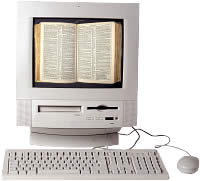The Machine That Made Us
[Translations: Japanese]
Computer scientist Joseph Weizenbaum recently passed away at the age of 85. Weizenbaum invented the famous Eliza chat bot forty years ago. Amazingly this pseudo-AI still has the power to both amusing and confuse us. But later in life Weizenbaum became a critic of artificial intelligence. He was primarily concerned about the pervasive conquest of our culture by the computational metaphor — the idea that everything interesting is computation — and worried that in trying to make thinking machines, we would become machines ourselves. Weizenbaum’s death has prompted a review of his ideas set out in his book “Computer Power and Human Reason“.
On the Edge Nick Carr says this book “remains one of the best books ever written about computing and its human implications. It’s dated in some its details, but its messages seem as relevant, and as troubling, as ever. Weizenbaum argued, essentially, that computers impose a mechanistic point of view on their users — on us — and that that perspective can all too easily crowd out other, possibly more human, perspectives.” He highlights one passage worth inspecting.
The computer becomes an indispensable component of any structure once it is so thoroughly integrated with the structure, so enmeshed in various vital substructures, that it can no longer be factored out without fatally impairing the whole structure. That is virtually a tautology. The utility of this tautology is that it can reawaken us to the possibility that some human actions, e.g., the introduction of computers into some complex human activities, may constitute an irreversible commitment. . . . The computer was not a prerequisite to the survival of modern society in the post-war period and beyond; its enthusiastic, uncritical embrace by the most “progressive” elements of American government, business, and industry quickly made it a resource essential to society’s survival in the form that the computer itself had been instrumental in shaping.
That’s an elegant summary of a common worry: we are letting the Machine take over, and taking us over in the process.
Reading this worry, I was reminded of a new BBC program called “The Machine That Made Us.” This video series celebrates not the computer but the other machine that made us — the printing press. It’s a four part investigation into the role that printing has played in our culture. And it suggested to me that everything that Weizenbaum said about AI might be said about printing.
So I did a search-and-replace in Weizenbaum’s text. I replaced “computer” with this other, older technology, “printing.”
Printing becomes an indispensable component of any structure once it is so thoroughly integrated with the structure, so enmeshed in various vital substructures, that it can no longer be factored out without fatally impairing the whole structure. That is virtually a tautology. The utility of this tautology is that it can reawaken us to the possibility that some human actions, e.g., the introduction of printing into some complex human activities, may constitute an irreversible commitment. . . . Printing was not a prerequisite to the survival of modern society; its enthusiastic, uncritical embrace by the most “progressive” elements of government, business, and industry quickly made it a resource essential to society’s survival in the form that the printing itself had been instrumental in shaping.

Stated this way its clear that printing is pretty vital and foundational, and it is. I could have done the same replacement with the technologies of “writing” or “the alphabet” — both equally transformative and essential to our society.
Printing, writing, and the alphabet did in fact bend the culture to favor themselves. They also made themselves so indispensable that we cannot imagine culture and society without them. Who would deny that our culture is unrecognizable without writing? And, as Weizenbaum indicated, the new embedded technology tends to displace the former mindset. Orality is gone, and our bookish culture is often at odds with oral cultures.
Weizenbaum’s chief worry seems to be that we would become dependent on this new technology, and because it has its own agenda and self-reinforcement, it will therefore change us away from ourselves (whatever that may be).
All these are true. But as this exercise makes clear, we’ve gone through these kind of self-augmentating transitions several times before, and I believe come out better for it. Literacy and printing has improved us, even though we left something behind.
Weizenbaum (and probably Carr) would have been one of those smart, well-meaning elder figures in ancient times preaching against the coming horrors of printing and books. They would highlight the loss or orality, and the way these new-fangled auxiliary technologies demean humanity. We have our own memories, people: use them! They would have been in good company, since even Plato lamented the same.
There may indeed be reasons to worry about AI, but the fact that AI and computers tend to be pervasive, indispensable, foundational, self-reinforcing, and irreversible are not reasons alone to worry. Rather, if the past history of printing and writing is any indication, they are reasons to celebrate. With the advent of ubiquitous computation we are about to undergo another overhaul of our identity.


